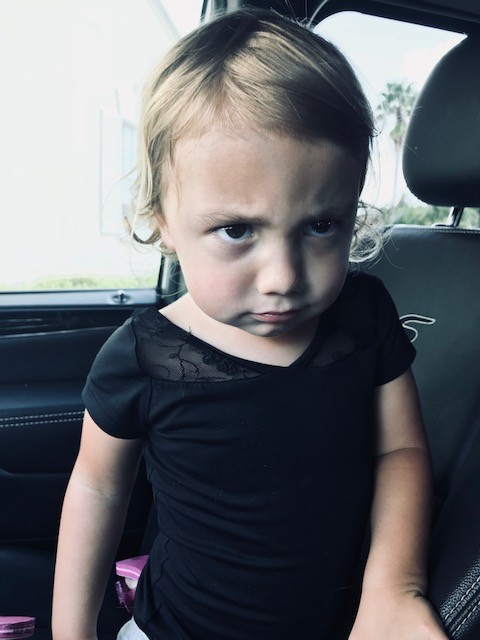
Lately at bedtime, my 2.5-year-old will lie down, look up at me and say “I have a question.”
Me, who is fluent in toddler, knows that this means she has a statement or remark that she wants to make and have heard.
So, I ask her, “What’s your question, Boo?”
Yes; I am one of those mothers that use nonsensical pet names for my children driving my husband (and probably the general public) up a wall.
“Sometimes I get mad” she states.
I’ll tell you that the first time she uttered that expression to me, I almost laughed. Not with the intent to make fun of her, but merely because I was so taken aback at my not-even-three-year-old forming and calmly articulating a coherent sentence about her feelings, albeit a negative, yet natural one.
“Sometimes I get mad.”
Wow.
How impressive it is to hear an innocent child admit having unbecoming feelings without wallowing in self-pity or with anticipation of fear of judgment.
Every time she makes this statement to me, which, recently, is a lot, I begin by validating her emotion.
“It’s okay to get mad,” I tell her.
Then I make her feel supported and not judged.
“It’s okay to get mad; everyone gets mad sometimes.”
I then am sure to note for her appropriate and non-appropriate ways to express frustration.
But, even when we get mad, we are not allowed to be mean. We do not hurt people. We do not say hurtful things, and we only use our hands for nice touching.
At this point, my daughter usually quickly nods in agreement to appease me and quiet me down and then restates “Sometimes I get mad.”
Repeat the above conversation about seven times, add in a face-tracing session, and a handful of kisses and my sweet angel eventually drifts off to dreamland.
As she falls deeper into her slumber, I typically turn my attention between admiring her beauty and scrolling my Facebook feed. However, honestly, ever since her new routine of these nighttime disclosures, I can’t help but dwell on them, and with typical desire to always improve attitude, well hunt for a lesson.
As I kneel next to her bed for a few minutes ensuring she is, in fact, asleep, I come to the realization that its quite amazing that my toddler is capable of recognizing and voicing her negative emotions, and it becomes blatantly clear to me just how hard of a time we adults have doing such.
Almost daily (okay, most definitely daily) I become frustrated — at myself, my children, situations, traffic, the weather, laundry, you name it, and I find a way to become riled up about it.
Now, do I typically express my dissatisfaction with a clean and concise sentence stated calmly and without fear of judgment?
No.
I yell.
I yell a lot.
And, I growl or groan. It’s seriously embarrassing even to admit. I fast-walk and stomp and complain, sometimes under my breath and sometimes loudly that I am not a happy camper.
But this is not okay, right? Or is it?
I’m not hitting. Thank goodness.
I’m not biting. Because who does that.
I’m a little bit mean, but more to myself and surroundings than anyone else.
But, why is it that I have such a hard time simply monitoring my emotions and internal state and voicing them appropriately, having a dialogue around them and moving on, just like my munchkin.
Is it that our children don’t feel the weight of a gagillion tasks?
Is it that they are immune to feeling pressure from others?
Is it that they don’t understand yet what judgment is and therefore remain unaffected by it?
While it is likely a combination of all of these, I also contend that children are innately mindful and in tune with the present and their present.
I’ve shared before that I need and want to be more like my seven-year-old — confident, curious, and a killer combination of grit and grace.
I’ve also talked about how I need and want to be more like my son, my four-year-old, who has a heart of gold, amazing instincts, and an insatiable zest for nature and animals and all things inherently beautiful in life.
Well, now I share with you why I need and want to be more like my toddler; the two-foot-tall powerhouse that runs this ship. I need and want to be in charge of me, in the same way, she is in charge of her. I want to take a cue from her and improve my ability to analyze my day, see where and when my mood and feelings changed and think and talk openly, honestly, unfearfully about why and what I can learn from them.
You know, this parenting thing is pretty damn crazy, there sure are days and weeks when I question who is raising who and don’t desire to have it any other way.
This post comes from the TODAY Parenting Team community, where all members are welcome to post and discuss parenting solutions. Learn more and join us! Because we're all in this together.
